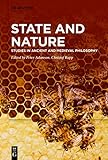State and Nature : Studies in Ancient and Medieval Philosophy / ed. by Peter Adamson, Christof Rapp.
Material type: TextPublisher: Berlin ; Boston : De Gruyter, [2021]Copyright date: ©2021Description: 1 online resource (XI, 424 p.)Content type:
TextPublisher: Berlin ; Boston : De Gruyter, [2021]Copyright date: ©2021Description: 1 online resource (XI, 424 p.)Content type: - 9783110735437
- 9783110731033
- 9783110730944
- 113.093 23
- B118 .S83 2021
- online - DeGruyter
- Issued also in print.
| Item type | Current library | Call number | URL | Status | Notes | Barcode | |
|---|---|---|---|---|---|---|---|
 eBook
eBook
|
Biblioteca "Angelicum" Pont. Univ. S.Tommaso d'Aquino Nuvola online | online - DeGruyter (Browse shelf(Opens below)) | Online access | Not for loan (Accesso limitato) | Accesso per gli utenti autorizzati / Access for authorized users | (dgr)9783110730944 |
Frontmatter -- Table of Contents -- Introduction -- Part I: Plato and Aristotle -- Human Nature and Legal Norms: Antiphon the Sophist as Anonymous Target in Plato’s Republic IX -- Natural Born Philosophers -- Normative Naturalism in Aristotle’s Political Philosophy? -- Whose State? Whose Nature? How Aristotle’s Polis is ‘Natural’ -- Aristotle on Freedom, Nature, and Law -- Aristotle on the Rationality of Women: Consequences for Virtue and Practical Accountability -- Part II: Hellenistic Philosophy -- Cynic Origins of the Stoic Doctrine of Natural Law? -- The Normativity of Nature in Epicurean Ethics and Politics -- Nature and Psychology in Cicero’s Republic -- Unnatural Law: A Ciceronian Perspective -- Natural Law and Casuistic Reasoning in Roman Jurisprudence -- Part III: Late Antiquity -- Human Nature and Normativity in Plotinus -- On Justice in Porphyry’s On Abstinence -- Early Christian Philosophers on Society and Political Norms -- Part IV: Medieval Philosophy -- Against Nature: Two Critics of Naturalism in the Islamic World -- “Like Ants in a Colony We Do Our Share”: Political Animals in Medieval Philosophy -- Ockham on Human Freedom and the Nature and Origin of Lordship -- Index of Names -- Index of Subjects
restricted access online access with authorization star
http://purl.org/coar/access_right/c_16ec
A much-maligned feature of ancient and medieval political thought is its tendency to appeal to nature to establish norms for human communities. From Aristotle's claim that humans are "political animals" to Aquinas' invocation of "natural law," it may seem that pre-modern philosophers were all too ready to assume that whatever is natural is good, and that just political arrangements must somehow be natural. The papers in this collection show that this assumption is, at best, too crude. From very early, for instance in the ancient sophists' contrast between nomos and physis, there was recognition that political arrangements may be precisely artificial, not natural, and it may be questioned whether even such supposed naturalists as Aristotle in fact adopt the quick inference from "natural" to "good." The papers in this volume trace the complex interrelations between nature and such concepts as law, legitimacy, and justice, covering a wide historical range stretching from Plato and the Sophists to Aristotle, Hellenistic philosophy, Cicero, the Neoplatonists Plotinus and Porphyry, ancient Christian thinkers, and philosophers of both the Islamic and Christian Middle Ages.
Issued also in print.
Mode of access: Internet via World Wide Web.
In English.
Description based on online resource; title from PDF title page (publisher's Web site, viewed 01. Dez 2022)


